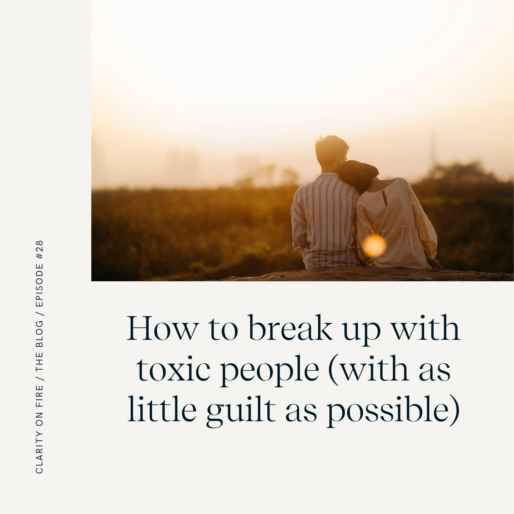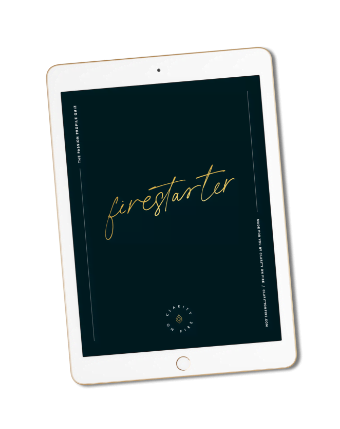If reading long blogs just isn’t your deal, you can listen to me read it instead! Click the play button below, or subscribe and listen through our podcast on iTunes, Stitcher, or Google Play.
Podcast: Play in new window | Download
Something’s been coming up lately that’s clearly resonating with a LOT of people. It boiled over during a workshop Kristen and I were doing a while back.
During a Q&A, someone asked a question that, all of a sudden, prompted other people to chime in with variations of, “OMG, it’s not just me?!”
The issue? It went something like, “How do you ‘break up’ with toxic people?”
The person who shared her story said that she’d been trying to distance herself from a group of friends that were always making her feel bad about herself, never “got her,” and were actively harassing her over email (yikes).
While hopefully most of you aren’t being actively harassed, I think it’s VERY worth addressing right now, don’t you? Because I know a lot of you have been there when it comes to funky or downright toxic relationships (be they platonic, familial, or anything else).
And even if you’re blessed with non-toxic friendships, I bet you’d like to know how to handle generally difficult people, yes?
NOT MY CIRCUS, NOT MY MONKEYS
This should become your new mantra (not the thing about the monkeys, though feel free to adopt that, too!). Repeat after me:
What other people say and do is about them. Not me. In fact, it neversays anything about me.
Personally, I tend to get pretty miffed when people are rude. Take, for example, when I schedule an initial coaching session with someone, we confirm the call the day before, and then they totally ghost me. They don’t bother to send a “Sorry, can we reschedule?”email or a quick text that they can’t make it. Nothing.
I get peeved about this. Why? Because my time is valuable, and if I’d known you were going to be a no-show I might have given it away to someone who was eager to talk.
But then I remember the truth: No matter why they were rude, their behavior says nothing about me.
We have a tendency to automatically assume that other people’s rude, dismissive, angry, bossy, or otherwise annoying behavior must have somethingto do with us.
In my case, I’ll think things like, “What if I’m a shitty coach?”or “What if I somehow did something to shut this person down?”
But do you know what’s muchmore likely? The person got scared.
Because after all, choosing to get coached means opening yourself up to change. And change terrifies the crap out of some people. So they’ll “forget” to call me, or just run away, because they flirted a little too closely with change and couldn’t handle it.
Or maybe they legitimately forgot. Maybe they got stuck in traffic. Maybe they got caught up in a work meeting.
It doesn’t really matter why they did what they did. It still has nothing to do with me.
People can miraculously become un-toxic when you realize that their behavior has nothing to do with who YOU are. Often, we’re allowing people to grate on us because of how we’re interpreting them.
Sometimes, just detaching yourself from their crap and shifting the lens through which you see them is enough to neutralize any bad energy you feel. You can let it go and move on. But sometimes, a clean break is necessary.
YOU CAN’T TRY TO FIX PEOPLE
All of my clients are really kind, loving people. And the ones who have a tough time with difficult friends (or any other kind of person) are typically the same ones who think, “Well, if I just explained myself a little better,”or “If I could just help them, then they would be easier to tolerate.”
Let’s make something really clear:
It is NOT your responsibility to “fix” anyone. Their inability to change, or behave in a decent manner, is not a failing on your part.
When you try to “fix” someone, a couple of things happen.
For one thing, you’re enabling their behavior. If someone isn’t willing to own up to their unhealthy patterns or take responsibility for themselves, nothing you do is going to make them see the light of day.
If the Universe, in its vast cosmic splendor, can’t make someone own up to their issues, why do you think you have that power? People have to be willing to change on their own. Period.
And secondly, by trying to “fix” someone you’re weirdly assuming that you know what’s best for them.
Look, none of us are experts on the point of life. Even the most evolved among us are still only guessing at what we’re doing here. Which means that it’s not your job to decide how someone else’s journey is supposed to unfold.
Sure, it would be great if all the toxic people in your life behaved differently so that you could have an easier existence. But what if where they are is where they’re supposed to be?
What if they’re learning some lesson that they really need for their own spiritual growth? Or what if they need to hit rock bottom before they can take responsibility for their behavior?
When you attempt to fix someone, you sometimes rob them of their ability to learn. And if their journey is causing you grief and strife, you don’t have to be a witness to it. You’re allowed to bow out. Which leads me to…
YOU’RE NOT A BAD PERSON
When contemplating breaking up with a friend a lot of people will ask, “Am I a bad person for wanting distance from them?”and say, “I feel so guilty for not wanting to be around them anymore.”
Don’t get it twisted. If someone is constantly draining your energy, making you feel bad about yourself, or treating you poorly … you have every right to “break up” with them.
I have a client who actively chose to separate herself from her mom for the past six months. Talk about a guilt-inducing experience!
The other day she was sharing how she sometimes feels like a “bad daughter” for creating this distance. (Which makes sense, considering the societal expectation of what it means to be a “good” child.)
But on the other hand, she acknowledged that her mom has been a genuine bully in her life for as long as she can remember, and she’s felt better in six months of not speaking than she has in years. She’s more energetic and productive, and she’s accomplished SO many wonderful things in her personal and professional life. And that’s not an accident.
You know what’s funny? If you were in a romantic relationship with someone toxic,everyonewould support you in breaking up with that person. But with friends or colleagues or family we somehow feel like we “can’t” or that it’s “different.”
People are people! And any person, including friends and family,that makes you feel like crap is someone that you’re allowed to distance yourself from, temporarily or permanently.
You’re not doing yourself, or them, any favors by chaining yourself to a sinking ship and allowing it to take you under.
Again, who ultimately knows what the point of life is, but I can assure you that the point definitely is NOT to martyr yourself and allow your life to become a cesspool of resentment and depression.
HOW TO INITIATE A BREAK UP AND NOT FEEL LIKE AN ASSHOLE
Here’s my best (and brief) guidance when it comes to making a break and still feeling good about yourself:
- Realize that it’s not supposed to feel good at first. Breaking up with people is naturally awkward and very If you wait until you feel 100% brave or 100% ready, you’ll never do it. It’s supposed to feel scary and uncomfortable. Do it anyway.
- Get it out in a way that makes you feel authentic. I told the woman who felt harassed to write a thoughtful, firm, and honest email to her toxic friends that made her feel like she’d held nothing back. Getting everything off of your chest and feeling like there’s nothing left to say means you can hit send (or hang up, or walk away) and be at peace with your choice.
- Don’t point blame at them (even if they deserve it). Because that’s just going to trigger their defensiveness and closed-mindedness. Make this about you, your values, and how you desire to live your life, not about what they’ve done.
- Really, truly refrain from re-engaging. Toxic people often refuse to let things go. They might rage, cry, bitch, moan, and manipulate … but hold firm. You can’t have a clean break if you allow people to creep back in and steal your time and energy.
- Trust that you’re a good person and will make better connections in the future. The Universe loves to fill space. Which means if you have the courage to cut toxic connections from your life, you’ve just created a big vacuum that can be filled with people who are kind, respectful, and genuinely interested in and appreciative of you. If you hold on to crappy connections, you can’t be a match to the people you’re meant to be with.
So, what do you think? Have you had experience with toxic friendships or difficult people? Come share with me in the comments!
STRUGGLING TO DO THIS ON YOUR OWN?
Toxic connections are just one thing that weighs a person down. We’re often barraged on all sides by crap that keeps us feeling heavy, stuck, and incapable of being who we really are.
Letting go of that crap (in a way that’s sustainable and permanent) is a big part of what we do in 1-on-1 coaching. If you’re considering working with us, now is a great time!
Check out our 1-on-1 coaching page and get on our calendar to chat about it, here.
LIKED THIS? THEN YOU’LL ALSO LOVE …
Kristen’s blog about how to find your tribe
Our podcast episode about finding your tribe and growing a network with Carolyn Birsky
The giving-burnout-resentment cycle in relationships
Much Love,
Rachel (& Kristen)




I have a toxic colleague at work. She joined the team at the end of 2017 and at first I thought she was laid-back, nice and fun. She helped me professionally a few times and I thought everything was going well. But she quickly became very difficult to be around.
She keeps talking behind people’s back while pretending to be friendly, which also makes me wonder what she says about me when I’m not around. Whenever she talks to me though she makes it sound as if I were her only friend in the city.
We have quite a relaxed atmosphere at the office, but she makes it less relaxed by never talking to people directly when there’s a problem. She always comes to me, asking what she should do.
We have an international team and everyone is respectful of each other’s culture except for her. She is saying hurtful stuff about some nations and tries to pass it as a joke. But some things are actually quite racist and it’s difficult to just ignore them.
So I have decided I have enough of her offending me, my lifestyle, my country and my life’s choices and I’m trying to phase her out. It’s difficult, because I’m friends with almost everyone else at the office, but I can’t be around her too much. I noticed it causes me too much stress. But I also feel sorry for her sometimes. She is alone in a foreign country, not speaking the language (not that she’s learning…) and I understand that she wants some company, but my compassion has its boundaries too.
Anyway, I think it’s difficult to let somebody know that I only want to interact on a professional level. You have to see them almost every day at the office after all and if they get mad at you it can make the situation difficult.
Hey Joanna,
Ugh that is rough, I’m sorry! And you’re right. It’s difficult when you can’t fully cut ties because you work with someone. That said, I think you have firmer boundaries will be a big help. The next time she comes to you complaining or asking what to do, tell her that she should talk directly to the person she’s complaining about. The less advice you give her, the less she’ll lean on you. I know it’s difficult, but if someone is constantly offending you and even saying racist things, then you are allowed to set a hard boundary. She may rant and rave and dislike you, but I’m sure that the other people around you will understand and probably be grateful to you for setting that example, and embrace you more for being bold!
I broke up with my toxic friend the other day. She was pretty mad that I didn’t want to be her friend anymore. She sent me Four emails tell me everything that was wrong about me. I don’t care because now i’m through with her. I wish her the best in her life. But she is the most toxic person.I have ever been in my life and she was draining me mentally.
I recently broke up with a toxic friend. It was not the best experience. She told me her parents paid for her college And pointed all the bad things out about me. She has been diagnosed with cancer but I couldn’t deal with all her complaining anymore. Unfortunately that leaves her boyfriend who had to leave her because of all her nagging and came back. I hope she’ll be okay but she’s not my problem.
One of my goals this month is to clear out toxic people from my life. Some of my friends aren’t completely toxic (like the examples given in your article) but they have been wearing me out and I need to stand up for myself more.
What sucks is that the most toxic people in my life are my coworkers and managers. Those are the people that have been doing what is highlighted in the article. And I cannot leave my job at the current time despite trying everything to do so. I do not understand how being awful to someone who works for you is supposed to make them want to stay or do a good job. I have been trying to not take it personally but it’s very hard because if something goes wrong, their treatment is even worse so it does feel like it’s my fault, not theirs.
Thank you for the tips. I’m definitely going to keep them in mind this month.
Hey Gillian,
I know it’s REALLY hard when the toxicity is something you can’t immediately escape. But even when people are being mean to you and making you feel like it’s your fault, even if you’ll never be able to convince them that they have responsibility too, it can be a balm to remember that it really is about THEM, not you. I know it’s hard to believe that some days! And it’s OK if you can’t get there every day!